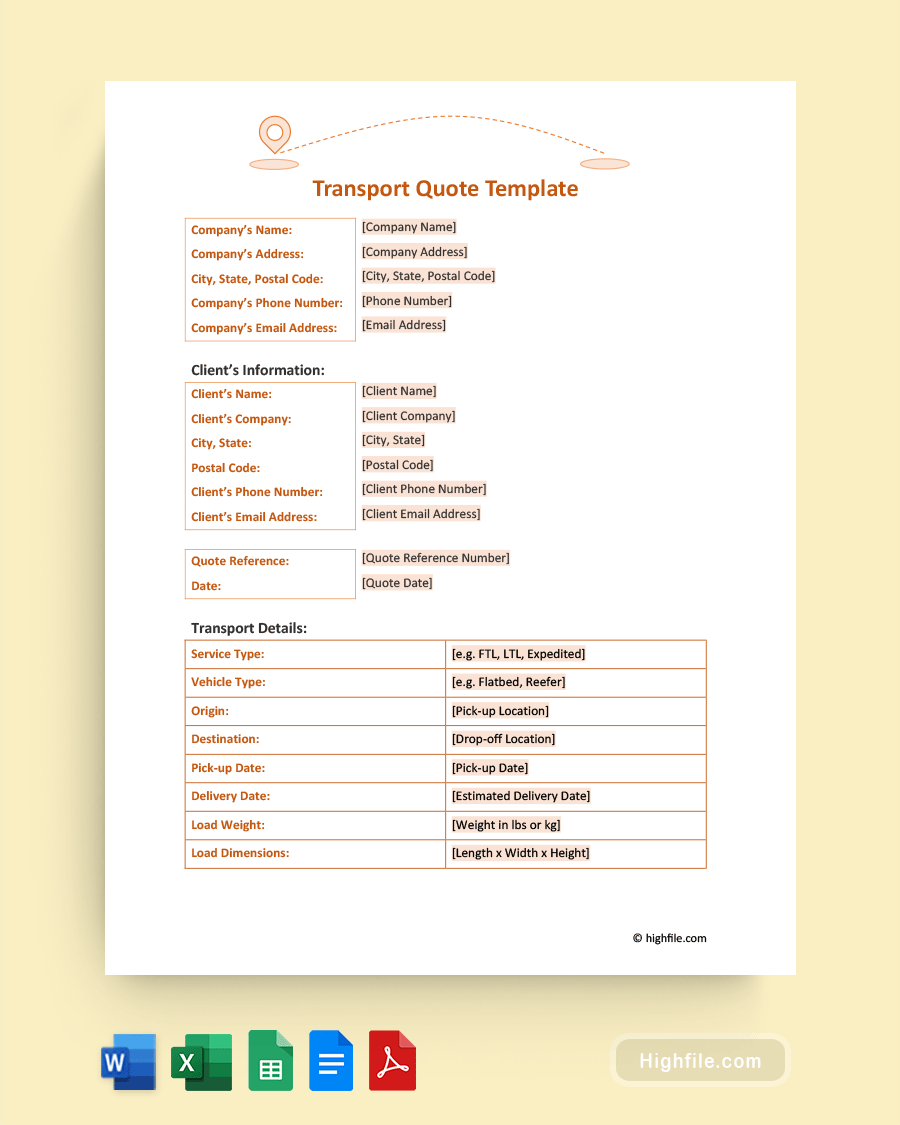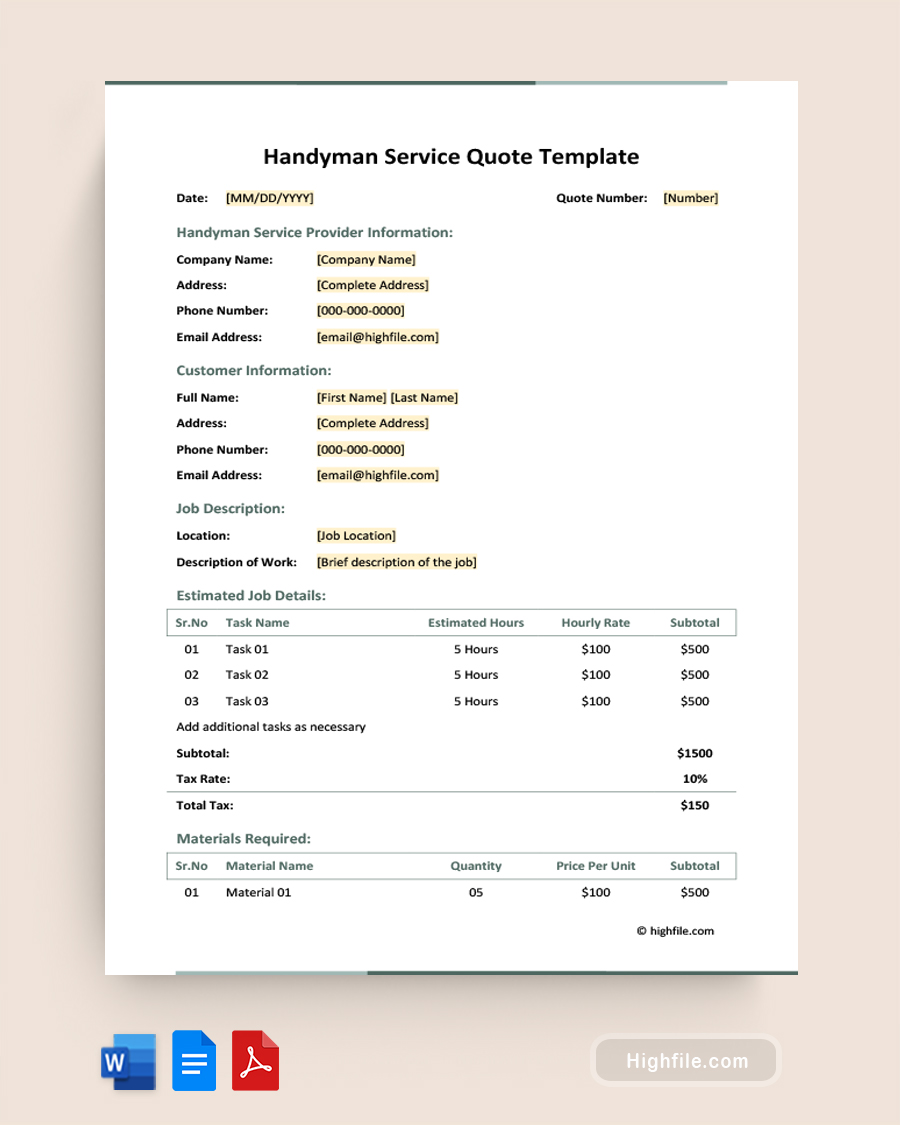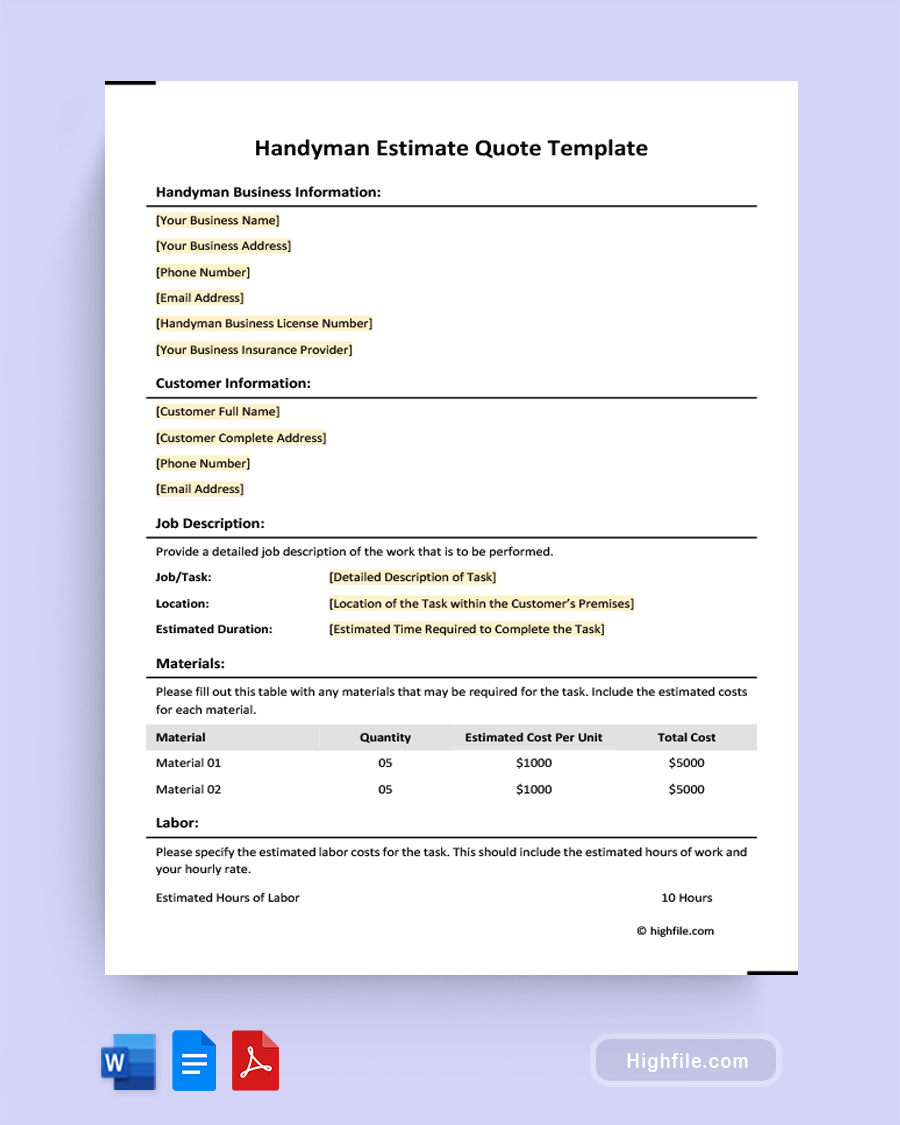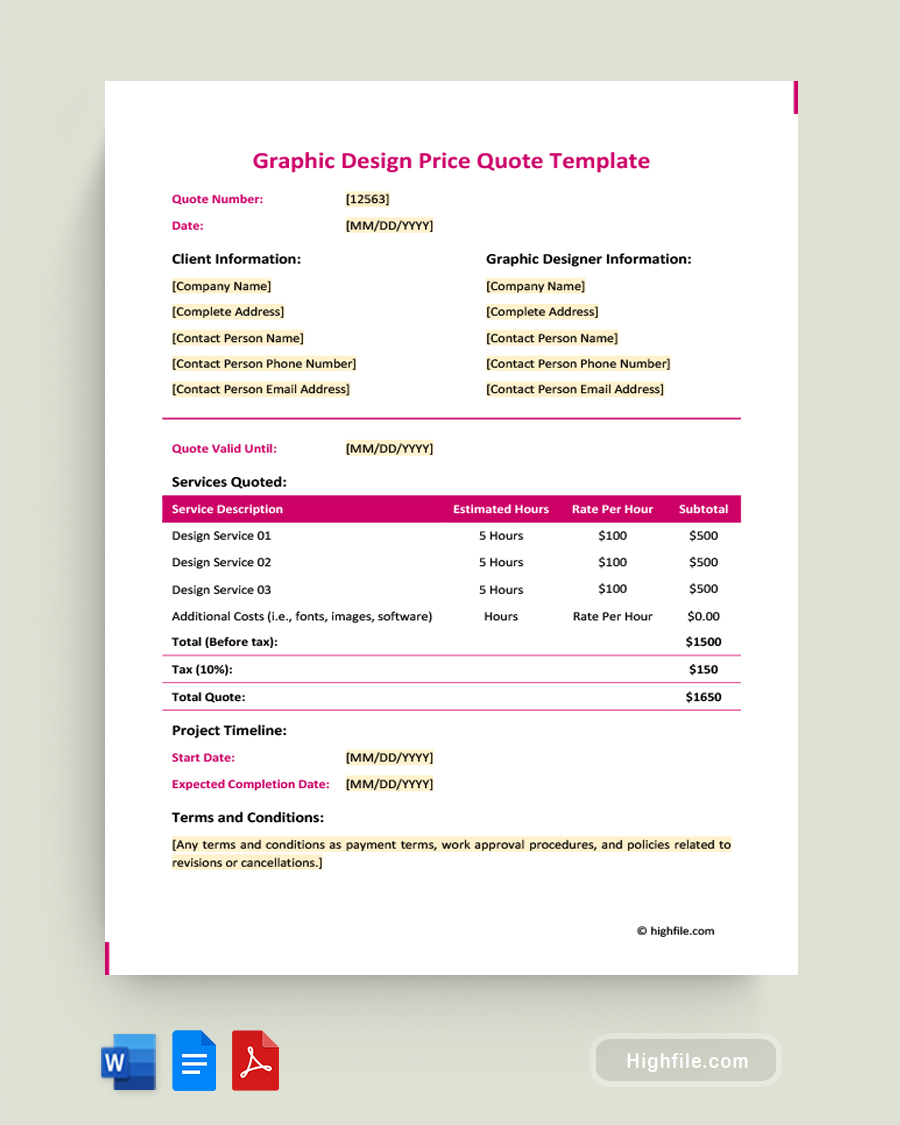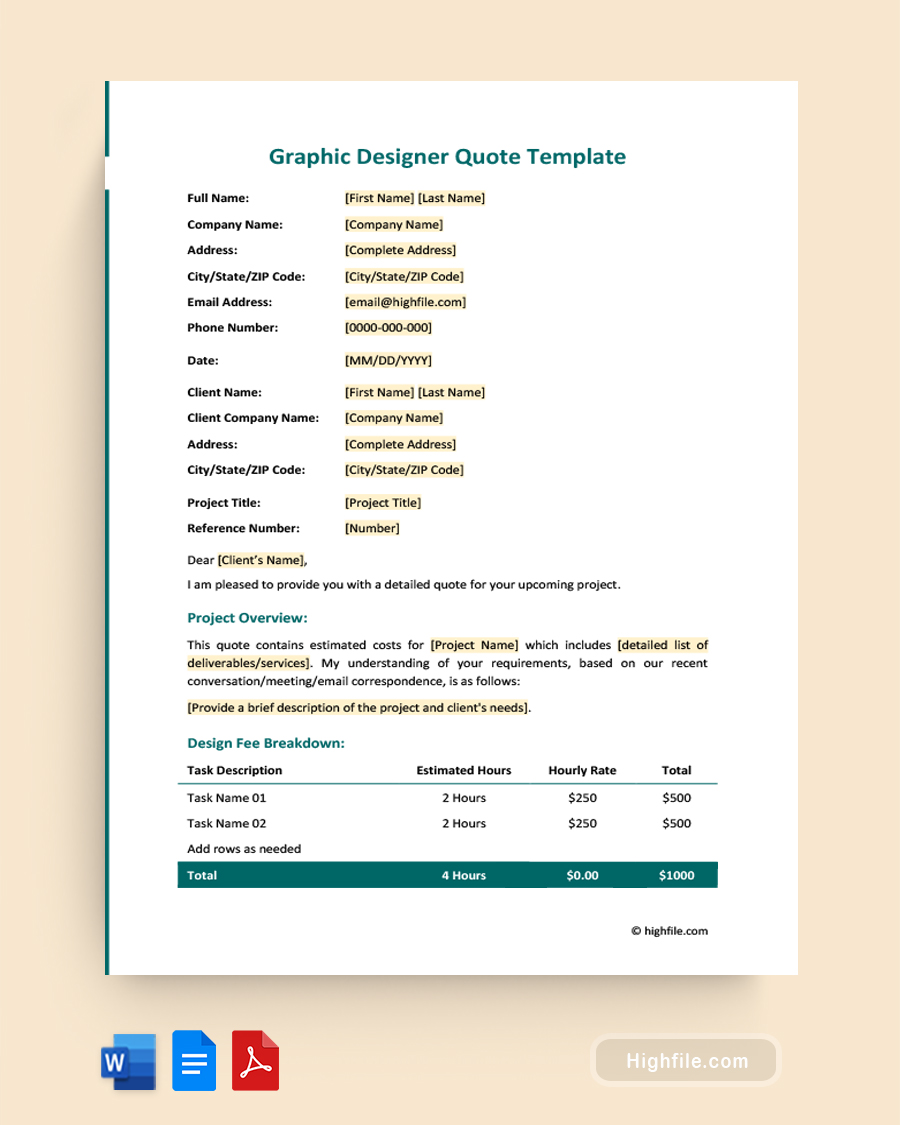Transport quote templates are an essential tool for businesses in the transportation industry, helping to provide their clients with a clear and detailed breakdown of the costs associated with their services. These templates can be customized to fit the specific needs of the business and offer a range of benefits that make them a must-have for businesses of all sizes. By using transport quote templates, businesses can establish trust and clear communication with their clients while also saving time and reducing the likelihood of errors or misunderstandings in the pricing and delivery of transportation services. In addition, transport quote templates help businesses to present a professional image and simplify the process of creating quotes for their clients. Whether you’re a small startup or a large enterprise, using a transport quote template can help you to provide your clients with a seamless and transparent transportation experience while also streamlining your business operations and increasing your bottom line.
What Is a Transport Quote Template
A transport quote template is a standardized document used by companies in the transportation industry to provide customers with a clear and detailed breakdown of the costs associated with their transportation services. This document typically includes information such as the shipping origin and destination, the type and quantity of goods being shipped, the mode of transportation, the delivery timeline, and the pricing breakdown. Transport quote templates help establish clear communication between the transportation company and their clients and ensure that all parties understand the costs and services involved in the transportation process.
Fun Fact: Accuracy is essential. In 2013, a transport company in Canada mistakenly quoted a customer $1,610 instead of $16,100 for shipping a container of goods. The company honored the quote, costing them over $14,000 in losses. This incident highlights the importance of accuracy and attention to detail when creating transport quotes.
Why Is a Transport Quote Template Important?
Transport quote templates are vital for businesses in the transportation industry, helping to provide their clients with a clear and detailed breakdown of the costs associated with their services. Here are some of the key reasons why a transport quote template is important:
- Provides clear communication between the business and their clients
- Establishes trust and transparency in the transportation process
- Saves time and reduces the likelihood of errors or misunderstandings in pricing and delivery
- Presents a professional image and simplifies the process of creating quotes for clients
- Helps businesses to streamline their operations and increase their bottom line.
- Allows for customization to fit the specific needs of the business and their clients
- Provides a record of the quote for future reference and accounting purposes
- Helps businesses to stay competitive in the transportation industry by providing accurate and timely quotes to clients.
Important Note: You can easily customize a transportation quote template to reflect your company identity and the client’s needs. Take advantage of the customization options to add relevant information, include visually dynamic elements like infographics, or include interactive elements like dropdown menus. Doing this helps demonstrate your professionalism and attention to detail, often leading to higher acceptance rates and more contracts.
Essential Elements of a Transport Quote Template
Transport quote templates help establish clear communication with clients and ensure all necessary information is included in the quote. The essential elements of a transport quote template are as follows:
- Company Information: This includes the transportation company’s name, address, and contact information.
- Client Information: This includes the client’s name, address, and contact information.
- Quote Number and Date: This is a unique identifier for the quote and the date it was issued.
- Transport Details Table: This includes columns for the service and description, which outline the specifics of the transportation service being provided.
- Pricing and Payment Schedule Table: This includes the description, quantity, unit cost, and total cost of the transportation service.
- Additional Services/Fees Table: This includes any additional fees, quantity, cost, and subtotal.
- Tax Percentage and Total: This outlines the tax percentage and total amount for the transportation service.
- Terms and Conditions: This may also be a table with a column for the term and one for a description outlining the terms and conditions of the transportation service.
- Acceptance Statement: This includes a statement that the client accepts the terms and conditions of the transportation service.
- Client Printed Name, Signature, and Date: This provides confirmation that the client has reviewed and agreed to the transportation service and its pricing.
- Closing Call to Action: This asks the client to contact the quoter in case of any questions or concerns.
Pro Tip: Be as detailed as possible in describing the transport details, including the pickup and delivery locations, dates, and times, as well as any specific requirements or instructions. This will help to ensure that the transportation service provider can accurately quote the job and minimize the risk of unexpected costs or delays during the transport process.
FAQs
When quoting for transportation services, it’s essential to consider several factors to ensure an accurate and fair price. These factors may include the distance of the journey, the type of cargo being transported, the mode of transportation (e.g., air, sea, road), the urgency of the delivery, any necessary permits or licenses, and any additional services required, such as packing or insurance. To determine the cost of transportation, businesses may calculate a per-mile or per-kilometer rate, factor in any fixed costs such as fuel or tolls, and add any necessary surcharges or fees. It’s also important to consider market rates and competitors’ pricing strategies to stay competitive in the industry.
The four basic costs of transportation are labor, equipment, fuel, and infrastructure. Labor includes the wages and benefits paid to drivers, handlers, and other transportation personnel. Equipment costs include the purchase, maintenance, and repair of vehicles and other machinery used for transportation. Fuel costs vary depending on the mode of transportation and the distance traveled. Infrastructure costs include the construction and maintenance of transportation-related infrastructure, such as roads, bridges, and ports. These costs are essential to consider when pricing transportation services and creating transport quotes.
When writing a transport quote, it’s important to include key information about the transportation services being offered and the costs involved. This may include the origin and destination of the shipment, the mode of transportation (e.g., air, sea, road), the type and quantity of cargo being transported, any additional services required (e.g., packing, insurance), and the estimated duration of the journey. Businesses may also include pricing information, such as a per-mile or per-kilometer rate, fixed costs such as fuel or tolls, and necessary surcharges or fees. Ensuring that the quote is accurate and transparent is crucial, providing clients with a clear understanding of the costs and services being provided. A transport quote template can help ensure consistency and accuracy across quotes and offer a professional and organized format for presenting information to clients.
Key Points
A business needs a transport quote template to provide its clients with a clear and transparent breakdown of the costs associated with transportation services. This helps to establish trust and clear communication between the business and their clients and ensures that both parties have a clear understanding of the transportation process. Transport quote templates also help businesses to save time by providing a standardized format for outlining costs and services and reducing the likelihood of errors or misunderstandings in the pricing and delivery of transportation services. Businesses can present a professional image by using a template to create transport quotes, establish themselves as reliable service providers, and simplify the process of creating quotes for their clients.
